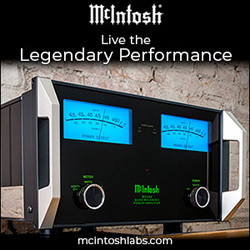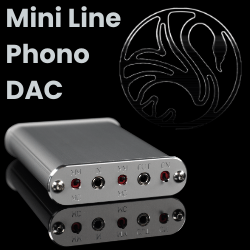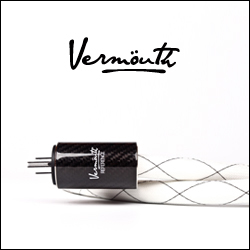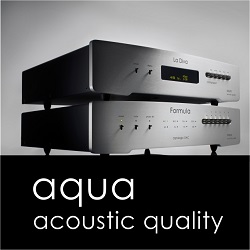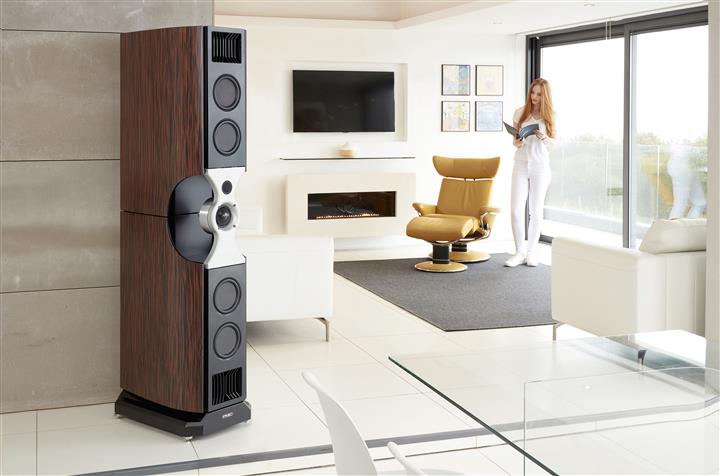
PMC’s first ever product, the BB5, was installed at the BBC’s Maida Vale studios, London, in the early 1990s and set such high standards for reference monitoring and sonic neutrality that they are still in use over a quarter of a century later. In what is the most significant PMC product launch since that time, PMC is today introducing the new flagship of the fact loudspeaker range – fenestria.
A three-way, ultra-high-resolution passive, twin Advanced Transmission Line (ATL) loudspeaker, fenestria incorporates all-new, tailor-made drivers, twin Laminair vents for improved aerodynamic ATL airflow, plus a newly designed cabinet that houses the treble and mid-range units in an innovative and elegant reflection-free module. The result is at once aesthetically beautiful and highly engineered, conveying the emotion of a musical performance with more subtlety and refinement than any other loudspeaker. Much of fenestria’s five-year design process has focussed on removing the unwanted distortion and colouration introduced by the loudspeaker itself, so that the listener hears nothing but music. For this reason, PMC refer to it as “the loudspeaker you’ll never hear.”
This willingness to incorporate innovation from other industries has led to the use of aerodynamic features inspired by motor sports engineering, damping techniques used in skyscraper construction to reduce damage during earthquakes, and new kinds of carbon fibre never previously employed in loudspeakers.
With fenestria, the key design principle has been the elimination from the drive units and cabinets of all unwanted vibrations. These reduce the clarity, precision and neutrality of the speakers, and introduce colouration that detracts from the musical experience. As the loudspeaker evolved, every element – drive units, cabinet, transmission line, crossover – was subjected to vibration analysis using sensitive accelerometers, and the results of this analysis directly influenced the final design.
The distinguishing visual marker of this 1.7m tall elegant loudspeaker is the central module or “nest”, housing the high frequency and midrange drive units. Honed from a solid billet of aluminium, the nest is isolated and decoupled from the rest of the cabinet. This prevents the enormous energy of the ATL and four bass drive units from interfering with the critical information coming from the high and mid-range units.
The 19.5mm Sonomex high frequency unit features a neodymium magnet assembly and PMC-designed dispersion grille for natural, open-sounding high frequencies and an extremely stable three-dimensional image. The driver is isolated from the midrange unit and nest with a silicone-damped PMC suspension mount, the Auriole.
PMC’s mid-range driver has achieved legendary status in both hi-fi and pro-audio worlds. The 75mm unit in fenestria is wholly new and takes the mid-range performance up to another level, even by PMC’s standards. Its spun aluminium form is acoustically inert and produces no unwanted reflections when mounted in the nest. The result is a stable, pin-sharp image that appears to emanate from the space around the speaker, rather than the drive unit itself.
The four 165mm long-throw piston bass drivers each feature a massive magnet assembly and a flat diaphragm comprising two layers of transverse-weave carbon-fibre, hand made by a specialist motor sport manufacturer, sandwiching a rigid multi-cellular damped core. The rigid but ultra-light diaphragm ensures a highly accurate, near-instantaneous response and provides the sheer power required to drive the compact, high-compression transmission line without deformation and consequent colouration.
Also shared with the world of motor sport are the Laminair vents situated at the end of the twin Advanced Transmission Lines (ATL), PMC’s proprietary bass-loading technology. Using principles of aerodynamics used from F1 to Le Mans, the Laminair vent creates a smooth, laminar airflow as it exits the ATL. This reduces turbulence and drag, increasing efficiency, eliminating air noise and producing a bass response with exceptional timing, depth and dynamic range at all levels.
Housing the ATL and bass units are the heavily braced cabinets, which are acoustically isolated from the drivers in the nest. Such is the high energy produced by the bass drivers and twin ATLs, a more innovative approach was required to preventing unwanted low-frequency vibrations from passing into the cabinet. Using the same techniques employed in tall buildings to prevent earthquake damage (whereby a high-mass pendulum is added to the structure), the sides of fenestria’s cabinet have been engineered to resonate in opposition to the rest of the loudspeaker assembly. The result is the elimination of vibrations before they leave the cabinet – the side panels cancel out all the unwanted energy produced by the drivers, leaving nothing but music.
Even the crossover, situated in the speaker’s plinth, is acoustically isolated from the rest of the cabinet. Every crossover component is meticulously tested and listened to before selection and is strategically positioned to eliminate interference between them. The plinth also houses the high- and low-frequency tuning controls, which ensure ideal integration with all rooms and source equipment.
Available in White silk, Rich walnut, Anthracite and Tiger ebony finishes, fenestria retails for $90,000 in Canada and $65,000 in USA (prices per pair).
Experience the PMC fenestria at the Montreal Audio Fest in room West Mount 2, Basement Level, from 22 – 24 March 2019.




